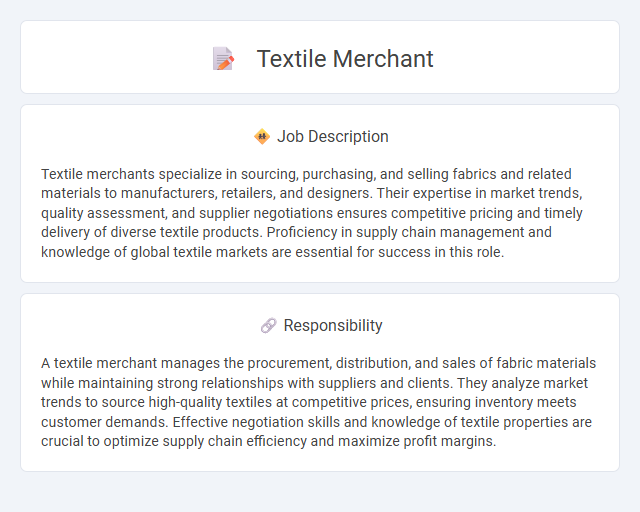
Textile merchants specialize in sourcing, purchasing, and selling fabrics and related materials to manufacturers, retailers, and designers. Their expertise in market trends, quality assessment, and supplier negotiations ensures competitive pricing and timely delivery of diverse textile products. Proficiency in supply chain management and knowledge of global textile markets are essential for success in this role.
Textile merchant roles likely suit individuals with strong negotiation skills and an aptitude for understanding market trends, as these attributes enhance success in trading fabric and materials. People comfortable working in dynamic, fast-paced environments with occasional long hours may find this profession aligns well with their lifestyle. Those who prefer routine and minimal interaction might face challenges adapting to the demands of this job.
Qualification
A textile merchant typically requires a strong foundation in textile science, fashion merchandising, or business administration, often supported by a bachelor's degree in these fields. Proficiency in market trend analysis, supply chain management, and negotiation skills is essential for successful fabric sourcing and sales. Experience with inventory control, export-import regulations, and customer relationship management further enhances a textile merchant's qualifications.
Responsibility
A textile merchant manages the procurement, distribution, and sales of fabric materials while maintaining strong relationships with suppliers and clients. They analyze market trends to source high-quality textiles at competitive prices, ensuring inventory meets customer demands. Effective negotiation skills and knowledge of textile properties are crucial to optimize supply chain efficiency and maximize profit margins.
Benefit
A textile merchant job likely offers the benefit of high income potential due to commission-based earnings linked to sales volume. It probably provides opportunities to build extensive networks within the fashion and manufacturing industries, enhancing career growth. Flexibility in work hours and the chance to travel for sourcing or client meetings might also be common advantages.
Challenge
A textile merchant job likely involves managing complex supply chains and navigating fluctuating market demands, which can present significant challenges. There is a possibility of facing intense competition and pressure to source high-quality materials at competitive prices. Adapting to evolving fashion trends and customer preferences may require continuous market research and strategic planning.
Career Advancement
Textile merchants specializing in fabric sourcing and sales can accelerate career advancement by developing expertise in supply chain management and international trade regulations. Mastery of market trend analysis and negotiation skills enables progression to senior roles such as regional sales manager or procurement director. Leveraging digital platforms and sustainability knowledge positions textile merchants for leadership opportunities within global fashion and manufacturing industries.
 kuljobs.com
kuljobs.com